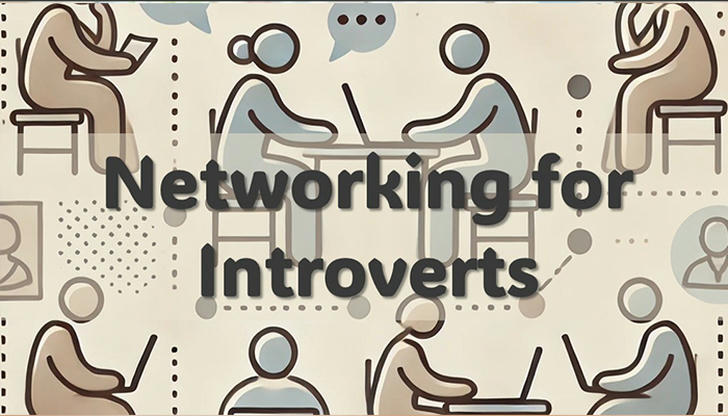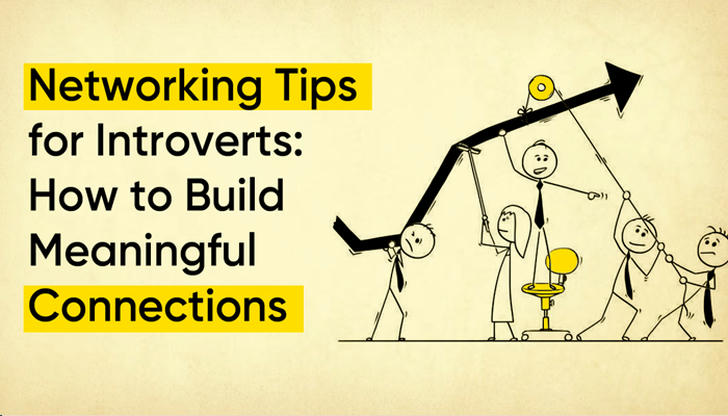Networking for Introverts: Building Connections Without the Awkwardness
Networking is often portrayed as loud conferences, cocktail mixers, and endless small talk—scenarios that make many introverts cringe. But here’s the truth: networking doesn’t have to be awkward, overwhelming, or inauthentic.
In fact, introverts often excel at building meaningful, long-term professional relationships—when they use the right strategies. Whether you're seeking a new job, starting a business, or growing in your current role, networking can open doors to opportunities that hard work alone might not unlock.
This guide will show you how to network effectively—in a way that respects your energy, personality, and comfort zone.

Why Networking Matters (Even If You’re an Introvert)
While many introverts prefer to let their work speak for itself, connections often amplify professional growth in powerful ways:
- Hidden job market: 70–80% of jobs are never publicly advertised.
- Mentorship: Strong relationships lead to valuable guidance and support.
- Collaboration: Partnerships and referrals come from trust and familiarity.
- Visibility: Being known in your field increases your credibility and opportunities.
Myth Busting: Networking ≠ Small Talk with Strangers
One major reason introverts dread networking is the assumption that it must be loud, fast-paced, and superficial. That’s not true.
Networking can also mean:
- A quiet 1-on-1 coffee with someone you admire
- Thoughtful interactions on LinkedIn
- Attending a webinar and asking one good question
- Sending a follow-up email after reading someone’s work
Quality > Quantity is often where introverts shine.

Step 1: Shift Your Mindset
Instead of viewing networking as self-promotion, reframe it as:
- Curiosity: You’re learning about others and how they work
- Service: You may help someone with your insights or connections
- Relationship-building: It's not about the number of business cards—it’s about meaningful connections
“Networking is simply starting a conversation with a purpose.” — Unknown
Step 2: Prepare Before You Connect
Introverts often feel more confident when they can plan in advance. So:
Identify Your Goals
- Are you seeking advice?
- Looking to explore new industries?
- Hoping to find a mentor?
Research the People or Event
- Check LinkedIn profiles
- Read their blog, company page, or recent work
- Prepare 1–2 thoughtful questions ahead of time
Practice Your Introduction
Have a few go-to sentences to describe who you are and what you do:
“Hi, I’m Alex. I work in healthcare data analysis and I’m exploring how AI is impacting patient care.”
Step 3: Choose Comfortable Networking Formats
Not all networking happens in loud rooms. Select formats that suit your preferences.
Best Formats for Introverts:
- One-on-one meetings: Coffee chats, virtual calls, or informational interviews
- Small group events: Workshops, roundtable discussions, or niche meetups
- Online platforms: LinkedIn, Slack communities, or industry-specific forums
- Volunteering: Serving on committees or helping organize events puts you in a natural networking role
Start small—just one connection a week can lead to significant growth over time.

Step 4: Leverage Online Networking
Introverts often thrive in written communication, making digital networking a strength.
LinkedIn Tips:
- Comment on posts with insights or questions
- Send personalized connection requests (e.g., “Hi Sarah, I enjoyed your article on remote leadership. Would love to connect.”)
- Share your own thoughts or helpful content regularly
Join Niche Communities:
- Reddit forums
- Discord groups
- Twitter/X circles
- Substack comment threads
The key is consistency—engage a little each week to build your presence naturally.
Step 5: Master the Art of the Follow-Up
Making the initial connection is just the start. Follow-up is where trust grows.
Simple Follow-Up Actions:
- Send a thank-you message after a conversation
- Share an article or resource relevant to your discussion
- Congratulate them on a recent achievement or post
- Ask a follow-up question a few weeks later
Your thoughtful follow-ups can stand out more than flashy introductions.

Step 6: Know Your Energy and Set Boundaries
Networking doesn’t have to mean draining your social battery. Use these strategies:
- Schedule recovery time after networking events
- Use “bookend planning”: Have quiet time before and after social interactions
- Be selective: You don’t need to attend every event—choose the most relevant ones
- Leave when you need to: It’s okay to step away after 30 minutes
Tracking how different networking experiences make you feel can help you refine your approach.
Step 7: Build Deep, Not Wide
Introverts excel at building trust, loyalty, and connection over time.
Focus on:
- Fewer, deeper relationships
- Long-term interactions rather than short-term gains
- Being a good listener and asking meaningful questions
You don’t need to “know everyone”—you need the right few people who genuinely understand and support your work.
Real-Life Example
Tina, a software developer, hated networking events. Instead, she:
- Commented regularly on LinkedIn posts in the AI space
- Attended monthly virtual AI meetups and asked one question each time
- Reached out to three speakers over six months for informational interviews
The result? She built relationships that led to a referral and landed a job at her dream company—without ever attending a big in-person event.
Final Tips: How to Start Networking Today
- Pick one person to reach out to this week
- Join one online community in your field
- Prepare a simple introduction about yourself
- Set a weekly “networking hour” on your calendar
- Track your progress and reflect on what feels good
Conclusion: Networking Is for Everyone
Networking isn’t just for extroverts—it’s for anyone who wants to grow, learn, and connect. As an introvert, you bring unique strengths: empathy, thoughtfulness, and deep listening. When you embrace these, you’ll find that meaningful networking becomes not just possible—but powerful.
“You don’t have to be the loudest person in the room to make the most impact. Just be the most genuine.”
Start small. Stay true to yourself. And watch your network—and opportunities—grow.
